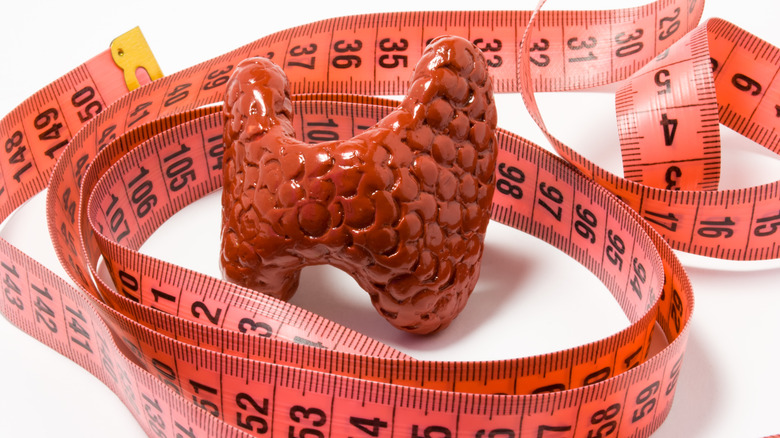You Might Gain Weight When If You Have This Thyroid Condition
Are you gaining weight despite eating healthy? Do you count your calories and stay physically active? Weight gain isn't always due to bad eating habits or lack of exercise. Hormonal changes, fluid retention, and certain medications may contribute to this problem, states Healthline. For example, people who take antidepressants, corticosteroids, or birth control pills are more likely to pack on pounds. Another common cause of weight gain is fluid retention, which tends to affect those with kidney or liver disease. If you're a woman, you may gain water weight around the time of your period.
The Mayo Clinic reports that 1 pound of fat equals 3,500 calories. Therefore, it's necessary to take in an extra 7,000 calories to gain 2 pounds of fat. These numbers are not set in stone, notes the American Institute for Cancer Research, but you can use them as a guideline to track your diet and eating habits. Massive weight gain doesn't happen overnight; so if the numbers on the scale are going up quickly, you might be dealing with an underlying condition.
For starters, consider having your thyroid checked. This small butterfly-shaped gland produces several hormones that regulate your metabolism and other processes, explains WebMD. Therefore, thyroid problems can affect your body's ability to use energy for fuel, leading to unintentional weight gain or weight loss.
The connection between thyroid disease and weight gain
An underactive thyroid, or hypothyroidism, can result in weight gain (via Dignity Health). This condition is associated with low thyroid hormone levels. Its symptoms include but are not limited to dry skin, constipation, tiredness, and increased sensitivity to cold, notes the American Thyroid Association. Your basal metabolic rate may decrease, too, says endocrinologist Harshit Shah. "While the condition may not cause any noticeable symptoms at first, it can lead to other health problems if left untreated — including weight gain," he told Dignity Health. Dr. Shah also reports that many patients can expect to pack on an extra 5 to 10 pounds.
On the positive side, hypothyroidism is unlikely to cause obesity. "Someone who comes to me weighing 300 pounds has other problems," said thyroid specialist Dr. Mark Lupo in an interview with AARP. The disease cannot be cured, but you can manage its symptoms through lifestyle changes and medications. "Once hypothyroidism is treated and thyroid hormone levels have returned to normal range, the ability to gain or lose weight is the same as in individuals who do not have thyroid disease," explains Dr. Shah.
He recommends taking your meds as prescribed and eating a balanced diet. Fill up on whole foods, ditch the sugar, and swap breakfast cereals for unrefined grains. Adequate sleep and regular exercise are just as important, points out Dr. Shah. Physical activity not only burns calories but also boosts your metabolism and builds lean mass.


